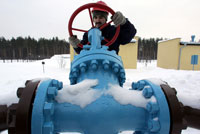Gas To Flow from Russia to Europe on Nord Stream in 2011
The Nord Stream gas pipeline, which aims to bring Siberian gas directly to Germany, bypassing all "problematic" Russian neighbours, was awarded its final building permit Friday. Construction is due to begin in April, the consortium announced.

A Finnish 'water permit' was the final authorisation required before construction can begin of the 1,223-kilometre pipeline, which will stretch under the Baltic Sea.
The project had already received all the permits required from the four other countries whose territorial waters or exclusive economic zones the pipeline will cross: Russia, Sweden, Denmark and Germany, Eurasia Review reports.
Pumping of Russian natural gas to Europe via the Baltic Nord Stream pipeline will start in September 2011, Prime Minister Vladimir Putin said on Friday.
"In May 2011, construction is to be completed on the sea section and on land in Germany and Russia. And gas will start to be pumped in September," Putin said at a meeting with Marcel Kramer, CEO of Dutch Gasunie, which has a 9% stake in the project.
Earlier on Friday, Russia's Gazprom received its final permit from Finland to build the $10 billion pipeline, which will allow the world's largest gas producer to bypass traditional transit countries blamed for previous disruptions in gas supplies to Western Europe.
Putin said in Helsinki on Thursday that Russia's energy strategy is based on an expected growth in global demand, and the structure of energy consumption is unlikely to change in the next 15-20 years despite the development of alternative sources. Russia currently supplies about 20% of the European Union's natural gas demand, RIA Novosti reports.
According to Deutsche Welle, Finnish environmental officials have given permission for a gas pipeline underneath the Baltic Sea, the final requirement for developers to begin the 7.4 billion euro ($10.6 billion) project between Russia and Germany.
Finland's government had already approved the venture, along with other affected countries Denmark, Sweden, Germany, and Russia, but the local environment agency also had to give the thumbs up. Almost 400 kilometers of the pipeline are expected to go through the Finnish economic zone.
Subscribe to Pravda.Ru Telegram channel, Facebook, RSS!




